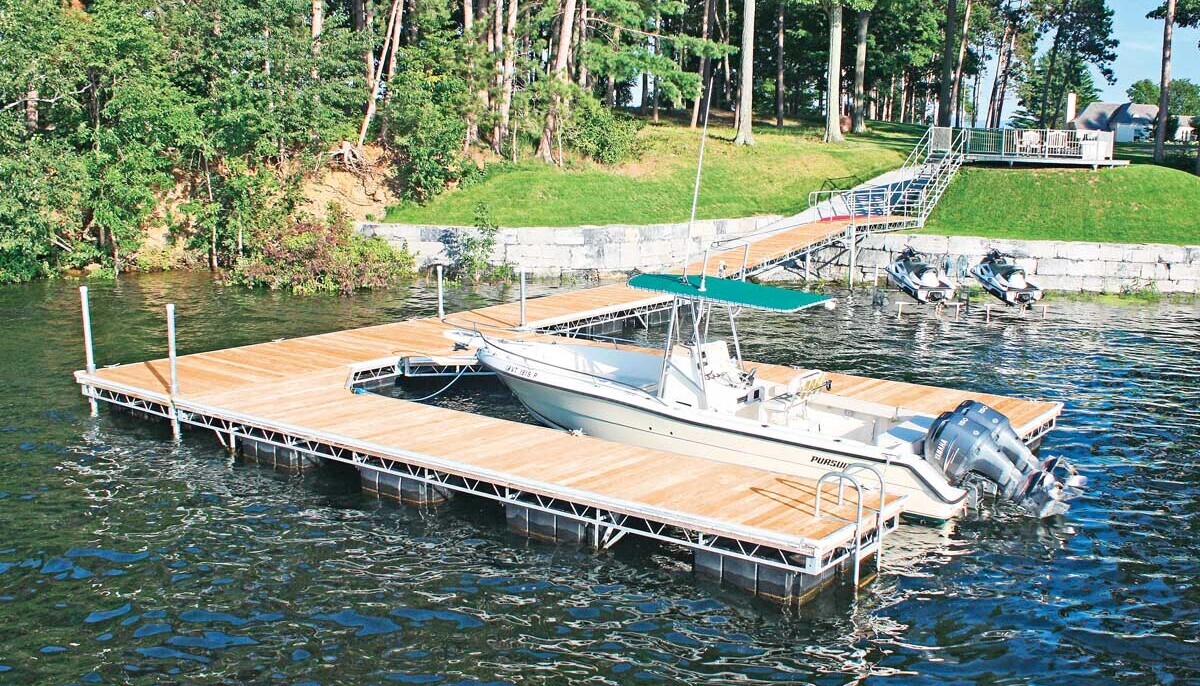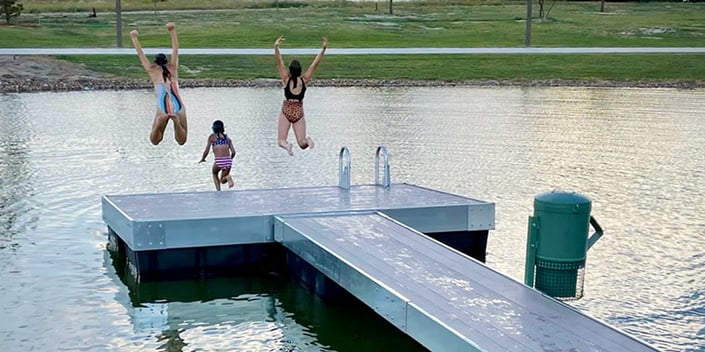Your Overview to Locating the most effective Dock Company for Quality and Reliability
Your Overview to Locating the most effective Dock Company for Quality and Reliability
Blog Article
Floating Docks: The Ideal Option for Versatile Water Accessibility
Floating docks existing an engaging remedy for a variety of water accessibility needs, using adaptability that goes beyond typical mooring options. Their capability to adjust to ever-changing water levels while making certain stability and safety and security makes them specifically advantageous for both commercial and leisure applications. In addition, the modular nature of floating docks helps with personalization, accommodating certain needs. Nonetheless, the nuances of installation and upkeep, together with the series of applications, warrant a closer exam to fully appreciate their possible benefits and implications for waterway access techniques.
Advantages of Floating Docks
Floating docks offer numerous benefits that improve water access for different applications. Their capacity to drop and increase with changing water degrees makes them especially beneficial in environments with rising and fall trends or seasonal variations. This flexibility guarantees that vessels can easily anchor without issue for the water's deepness, supplying a trustworthy platform for entertainment, industrial, and commercial usages.
In addition, floating docks are frequently built from durable materials that stand up to corrosion, making them appropriate for lasting use in marine environments. Their installation is generally less intrusive than conventional fixed docks, decreasing the ecological influence and promoting quicker release (floating dock services). This flexibility enables much easier moving or reconfiguration according to customer requirements or ecological adjustments
Safety is one more essential benefit; floating docks can provide stable accessibility for people boarding or getting off from boats and lower the danger of mishaps connected with unsteady surface areas. Moreover, they can be made to suit a selection of accessories, such as fenders and cleats, enhancing capability. In general, floating docks represent a reliable remedy for boosting water gain access to throughout varied markets while promoting safety and ecological sustainability.

Sorts Of Floating Docks
Different types of floating docks satisfy various requirements and atmospheres, each made with certain features to enhance functionality. One of the most common types consist of modular docks, which contain interlacing areas that enable for very easy personalization and development. These docks are suitable for recreational use, as they can be customized to fit numerous boat sizes and water problems.
An additional popular choice is the fixed floating dock, which remains secured in area yet floats with changing water degrees. floating dock builder. This type is specifically suited for areas with marginal tidal fluctuations, offering steady accessibility for angling or swimming. Additionally, there are drive-on docks, which include a sloped design that permits boats to conveniently drive on and off, making them ideal for individual watercraft and smaller vessels
For industrial applications, sturdy floating docks are readily available, built from enhanced products to withstand substantial loads and severe marine environments. Environmentally friendly floating docks use lasting materials and designs to reduce environmental influence, usually including functions like plants to sustain regional wild animals. Comprehending the various kinds of floating docks ensures that users can pick the most suitable solution for their specific demands.
Setup Refine Introduction
An effective installation of floating docks needs cautious planning and focus to detail to ensure optimum performance and safety. The first action involves analyzing the site conditions, consisting of water depth, existing, and possible obstacles. This analysis educates the choice of the suitable dock materials and layout tailored to the specific atmosphere.
Following, obtaining needed permits is crucial, as several jurisdictions have laws concerning building and construction on water bodies. The setup can continue once authorizations are protected. Begin by preparing the foundation, which might include anchoring systems or pilings customized to look at here now the dock kind and local problems.
Adhering to the foundation configuration, assemble the dock sections according to supplier specifications. Guarantee that all elements are firmly fastened and lined up to withstand ecological tensions. Position the dock in the assigned location, guaranteeing it is level and stable.

Maintenance Tips and Best Practices
After the installation process is full, recurring upkeep plays a crucial role in ensuring the long life and capability of floating docks. Normal examinations must be carried out to recognize any type of signs of wear, degeneration, or damage - floating docks. Examine for any type of loose installations, fractures, or separation in the dock areas, as these can compromise architectural stability
Cleaning the dock is important to eliminate debris, algae, and various other build-up that can influence its appearance and safety. Make use of a gentle stress wash occasionally to preserve cleanliness without triggering damage to the surface. Additionally, applying a protective sealant every couple of years can help enhance longevity and stand up to ecological wear.
Pay attention to the mooring lines and supports, guaranteeing they are free and protected from rust. Replace any type of degraded elements immediately to prevent threats. Seasonal changes may likewise be necessary; during severe weather condition problems, enhancing the dock or repositioning can protect against damage.
Applications for Floating Docks
Floating docks offer a wide variety of applications, dealing with both industrial and recreational needs. In leisure setups, they provide seamless accessibility to rivers for activities such as boating, fishing, and swimming. Their adjustable nature enables installment in differing water degrees, guaranteeing stable and safe gain access to despite tidal variations.
Readily, floating docks are indispensable for marinas and beachfront companies. They assist in the docking of vessels, making it possible for reliable unloading and loading of products. Their modular style enables for very easy development or reconfiguration to suit transforming organization needs, making them ideal for boat services, tour operations, or angling charters.
In addition, floating docks are made use of in ecological applications such as water research and habitat remediation. They can act as platforms for clinical researches, keeping track of water high quality, or carrying out wild animals surveys without disturbing delicate ecological communities.
In commercial contexts, floating docks are employed in construction projects, giving accessibility to hard-to-reach locations for devices and workers. Their adaptability, durability, and marginal effect on the setting make them an ideal option for a wide array of applications, improving both functionality and accessibility in numerous water-based atmospheres.
Conclusion
In verdict, floating docks represent an optimal option for diverse water accessibility needs, owing to their adaptability, sturdiness, and modular design. These frameworks assist in safe mooring for different he said applications while reducing ecological effect throughout setup. The reduced upkeep demands further boost their functionality. Floating docks serve as an important possession for recreational, business, and environmental projects, making sure trusted accessibility to rivers and advertising sustainable methods in aquatic settings.
Floating docks present an engaging service for a range of water gain access to requires, using convenience that goes beyond typical mooring alternatives.Floating docks offer various advantages that enhance water access for various applications. In general, floating docks stand for an efficient option for enhancing water gain access to across diverse sectors while promoting safety and ecological sustainability.
One more prominent description choice is the stationary floating dock, which continues to be secured in location however floats with altering water levels.In conclusion, floating docks represent an optimal solution for varied water gain access to needs, owing to their flexibility, resilience, and modular design.
Report this page